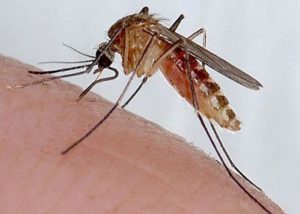 While the official hurricane season begins June 1 and runs through the end of November, hurricanes and tropical storms are most likely to develop when the waters of the Atlantic Ocean are warmest, typically in August and September. Given central Florida’s propensity for rain during the summer months, quite often by the time hurricane rains arrive soils are already saturated. Consequently, heavy rains from a hurricane or tropical storm fill retention ponds and stand for a period of time. Almost without fail, about a week after the storm has gone, the Extension office begins to receive calls about increasing mosquito populations and what can be done to spray for them. During a meeting last fall with an official from FDACS I was told the cost for mosquito fogging is typically one hundred dollars per mile while the cost of aerial spraying is $ 1.90 per acre. At a one-time aerial spray cost of just over two million dollars, one need not think too long to understand the county is unlikely to make aerial sprays unless there is a severe health risk. So why are mosquito populations so prolific following storms and since they are, what can residents do for protection?
While the official hurricane season begins June 1 and runs through the end of November, hurricanes and tropical storms are most likely to develop when the waters of the Atlantic Ocean are warmest, typically in August and September. Given central Florida’s propensity for rain during the summer months, quite often by the time hurricane rains arrive soils are already saturated. Consequently, heavy rains from a hurricane or tropical storm fill retention ponds and stand for a period of time. Almost without fail, about a week after the storm has gone, the Extension office begins to receive calls about increasing mosquito populations and what can be done to spray for them. During a meeting last fall with an official from FDACS I was told the cost for mosquito fogging is typically one hundred dollars per mile while the cost of aerial spraying is $ 1.90 per acre. At a one-time aerial spray cost of just over two million dollars, one need not think too long to understand the county is unlikely to make aerial sprays unless there is a severe health risk. So why are mosquito populations so prolific following storms and since they are, what can residents do for protection?
Many people believe mosquitoes must have water to lay their eggs and indeed in an effort to reduce mosquito populations during normal summer rains residents are encouraged to eliminate or regularly empty containers that may lead to population explosions. There is however, another type of mosquito known as the floodwater mosquito, that hatches not in water, but moist soils. When retention ponds fill, then recede following storm events, these eggs hatch and when added to populations of the normally occurring standing water mosquitoes, the population becomes untenable for anyone doing anything out of doors. Patience is a great virtue and if one waits, these populations soon recede naturally, aided by the drier and cooler days of fall.
Precautionary Measures
There are several precautionary measures residents can take if they must be outdoors in seasons of heavy mosquito populations. First, avoid being outside early in the morning or at dusk as this is the time of day when populations are most active. Next, if you must be outdoors wear long-sleeved shirts and long pants, shoes and socks. Consider the use of DEET products as a repellant. DEET has been available for many years, but has come under scrutiny in recent years as some individuals have had negative impacts from these materials. When applying DEET to exposed hands and face, be careful not to get this material on the lips or in the mucous membranes of the eyes. Be careful not to rub the eyes after using DEET. Do not spray hands with DEET then handle food products. Make it a priority to wash treated areas immediately after returning to the house to minimize exposure to DEET. Be judicious about the use of DEET on children, particularly those under the age of six.
Small fogging systems are a possibility for those who must conduct outdoor activities in backyards or on patios. Under calm conditions, a relatively inexpensive propane fogger can be purchased which will provide fairly good relief for a short period – a day or two – when there is no wind. Treat the evening before your planned activity or in the early morning hours for a late afternoon/early evening party. Target areas where mosquitoes hide – shrubs and bushes, under patios, in tall grass areas. Be prepared to move your party indoors as a backup plan.
For those who live near standing-water retention ponds, small round disks marketed under the name mosquito dunks are available and are relatively inexpensive. These treat 100 feet of surface water per tablet. A larvicide, mosquito dunks are harmless for humans, animals and the environment, but deadly for mosquito larvae. Dunks kill mosquitoes before they have an opportunity to become egg-laying adults. One treatment is good for 30 days and will probably get you through the heavy post-storm infestation period.
It isn’t every year – or even most years- that Florida experiences storms. When hurricanes or tropical storms do occur, expect mosquito populations to rise suddenly and to be heavy for several weeks. Plan your wardrobe and activities accordingly and exert a measure of patience while awaiting the drier conditions and cooler weather that will curb mosquito activity.
#Tropical Storm Michael
#Hurricane Michael
 0
0
